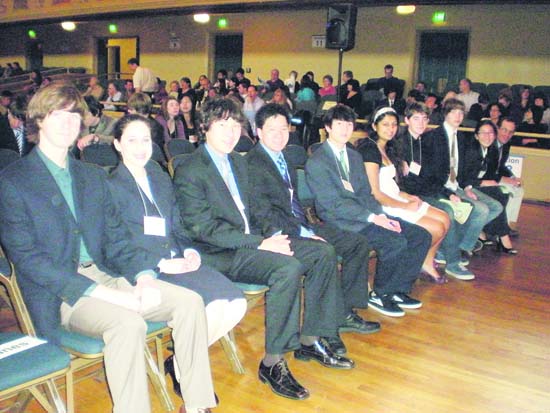| | Published April 1st, 2009
| Acalanes High School Academic Decathletes Take Gold Academic Challenges/Real World Skills
| | By Lucy Amaral |  | | Pictured are decathaletes Helen Wang, Carson Ley, Harrison Kim, Ted Netland, Sarah Jacobi, Adithi Rajapuram, Sam Haesse, Sheridan Moehle and David Marquis Photo provided
|
After months of research, self-testing, analysis, practice runs and even power-point Jeopardy, the Acalanes High School Academic Decathletes took home the gold at the 2009 California State Academic Decathlon, held March 13-16 in Sacramento. Coached by Acalanes faculty members Joe Schottland and Karen Findlay, the nine decathletes took the Division III first place team award, third place in the event's Super Quiz and pulled in 15 individual achievement awards.
 "What makes this competition unique is that, unlike others where you focus just on your best subject, here you need to be well-rounded in all subjects, as well as give speeches and do an interview," said Schottland. "(This competition) stresses not just rote learning. There are interpersonal skills, interview and speech skills that are important in the real world."
"What makes this competition unique is that, unlike others where you focus just on your best subject, here you need to be well-rounded in all subjects, as well as give speeches and do an interview," said Schottland. "(This competition) stresses not just rote learning. There are interpersonal skills, interview and speech skills that are important in the real world."
 According to California Academic Decathlon (CAD) rules, each team is comprised of three students with a grade point average (GPA) of 3.75 to 4.00, three with a GPA of 3.00 to 3.74 and three with a GPA of 2.99 and below.
According to California Academic Decathlon (CAD) rules, each team is comprised of three students with a grade point average (GPA) of 3.75 to 4.00, three with a GPA of 3.00 to 3.74 and three with a GPA of 2.99 and below.
 While Acalanes High School is known for its academic prowess, "The Decathlon gives smart students who haven't shone academically a platform to shine," said Schottland. "Karen and I look through the PSAT scores, grades and talk to a lot of teachers. We look for those students who are incredibly intelligent," but whose talents might not be reflected on a report card, to round out the team.
While Acalanes High School is known for its academic prowess, "The Decathlon gives smart students who haven't shone academically a platform to shine," said Schottland. "Karen and I look through the PSAT scores, grades and talk to a lot of teachers. We look for those students who are incredibly intelligent," but whose talents might not be reflected on a report card, to round out the team.
 This competition is not for the faint of heart, however. According to the CAD web site, the decathletes take 30 minute multiple-choice tests in Economics, Art, Music, Language and Literature, Mathematics, Science, and Social Science. As well, each competitor gives a pre-written 4 minute speech, a 2 minute impromptu speech, sits through a 7 minute interview, and has 50 minutes to write an essay.
This competition is not for the faint of heart, however. According to the CAD web site, the decathletes take 30 minute multiple-choice tests in Economics, Art, Music, Language and Literature, Mathematics, Science, and Social Science. As well, each competitor gives a pre-written 4 minute speech, a 2 minute impromptu speech, sits through a 7 minute interview, and has 50 minutes to write an essay.
 To prepare, the team met twice a week to review, test and prepare. According to Findlay, a great deal of work was done outside the official meetings. "The students do a lot of independent work outside the classroom, then come in and teach (their teammates)," she said. "You learn more when you are interactive, so we give students certain sections to study and they turn around and teach the other students."
To prepare, the team met twice a week to review, test and prepare. According to Findlay, a great deal of work was done outside the official meetings. "The students do a lot of independent work outside the classroom, then come in and teach (their teammates)," she said. "You learn more when you are interactive, so we give students certain sections to study and they turn around and teach the other students."
 Findlay is quick to point out the decathlon team did not work in a vacuum. "The Acalanes teachers have been incredibly helpful. Language teachers, English teachers, anyone who is asked, even a retired teacher, have come in to give their time and work with our students."
Findlay is quick to point out the decathlon team did not work in a vacuum. "The Acalanes teachers have been incredibly helpful. Language teachers, English teachers, anyone who is asked, even a retired teacher, have come in to give their time and work with our students."
 With the vast amount of information needed to compete in these decathlons Schottland said that motivation is key and that every student is motivated by different things. "Some students are motivated by success, some by getting medals and ribbons or by the camaraderie of finding other students with similar interests," he said. "Some are motivated by the fact we have food at our meetings."
With the vast amount of information needed to compete in these decathlons Schottland said that motivation is key and that every student is motivated by different things. "Some students are motivated by success, some by getting medals and ribbons or by the camaraderie of finding other students with similar interests," he said. "Some are motivated by the fact we have food at our meetings."
 Whatever it took to get them there, the result was golden.
Whatever it took to get them there, the result was golden.

|
| |
| | | |
